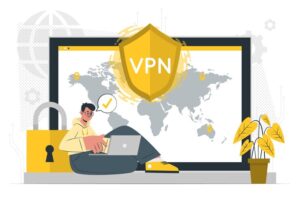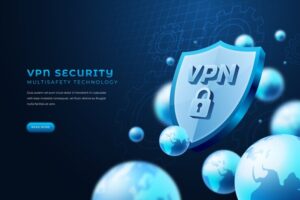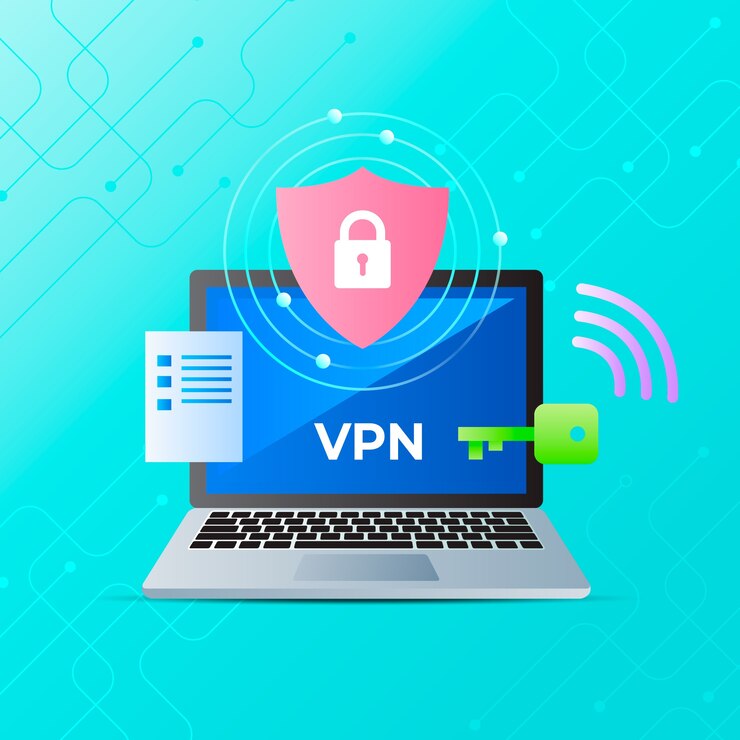Introduction
In today’s digital age, protecting your online privacy and ensuring fast, secure internet access has never been more important. A Virtual Private Network (VPN) is one of the best tools for achieving this. But with so many VPNs available, which one should you choose? This guide will help you navigate the options by breaking down the top 5 Best VPNs Network for fast, secure, and private internet access.
What is a VPN and Why Do You Need One?
A VPN, or Virtual Private Network, is a service that encrypts your internet connection, providing a secure tunnel for your data. It hides your IP address, making your online activities virtually untraceable. Whether you’re looking to protect your personal information from hackers, access geo-restricted content, or maintain your privacy from prying eyes, a VPN is a must-have.
Benefits of Using a VPN for Internet Access
- Enhanced Security: Protects your data from hackers and cybercriminals.
- Privacy Protection: Hides your online activities from your ISP and other third parties.
- Access to Global Content: Unblocks websites and services restricted in your region.
- Secure Public Wi-Fi Use: Protects you when connected to unsecured public networks.
The 5 Best VPNs for Fast, Secure, and Private Internet Access
Overview of the Selection Criteria
When selecting the best VPNs, we considered several factors: speed, security, privacy features, server network, ease of use, and cost. Here’s a quick rundown of the top 5 VPNs that excel in these areas.
Quick Comparison Table of the Top 5 VPNs
| VPN | Speed | Security | Server Locations | Price |
|---|---|---|---|---|
| ExpressVPN | Excellent | Strong | 94+ Countries | High |
| NordVPN | Very Good | Advanced | 60+ Countries | Medium |
| CyberGhost | Good | Reliable | 90+ Countries | Low |
| Surfshark | Good | Strong | 65+ Countries | Low |
| Private Internet Access (PIA) | Average | Customizable | 80+ Countries | Low |

1. ExpressVPN
Key Features of ExpressVPN
- Speed and Performance: Renowned for its lightning-fast speeds, ExpressVPN offers a smooth and reliable browsing experience, making it ideal for streaming and online gaming.
- Security and Privacy Features: Utilizes AES-256 encryption, TrustedServer technology, and a strict no-logs policy to ensure your data remains private.
- Server Locations and Availability: Boasts a vast network of over 3,000 servers in 94 countries, providing ample options for finding the fastest and most secure connection.
Pros of ExpressVPN
- High-speed connections across all servers.
- Strong encryption and privacy protocols.
- User-friendly interface with easy setup.
Cons of ExpressVPN
- Higher pricing compared to competitors.
- Limited configuration options for advanced users.
2. NordVPN
Key Features of NordVPN
- Double VPN and Onion Over VPN: Offers advanced security with its Double VPN feature and compatibility with the Onion network for extra privacy.
- CyberSec and Ad Blocking: Built-in CyberSec technology blocks ads and malware.
- Large Server Network: More than 5,400 servers across 60 countries, ensuring good performance and connection stability.
Pros of NordVPN
- Affordable pricing plans.
- Advanced security features like Double VPN.
- Strict no-logs policy to enhance user privacy.
Cons of NordVPN
- Some servers can be slower than others.
- Occasional connectivity issues reported by users.
3. CyberGhost
Key Features of CyberGhost
- NoSpy Servers: Provides additional privacy by routing your traffic through its independently operated NoSpy servers.
- Dedicated Streaming Servers: Optimized servers for streaming services like Netflix, Hulu, and more.
- Automatic Kill Switch: Ensures your data remains protected even if the VPN connection drops.
Pros of CyberGhost
- Easy to use for beginners.
- Affordable long-term plans.
- Supports up to 7 devices simultaneously.
Cons of CyberGhost
- Limited customization options.
- Average speed performance on certain servers.
4. Surfshark
Key Features of Surfshark
- Unlimited Devices: Allows unlimited simultaneous connections, perfect for families or small businesses.
- MultiHop Double VPN: Routes your traffic through multiple servers to enhance security.
- CleanWeb Ad Blocker: Blocks ads, trackers, and malware while browsing.
Pros of Surfshark
- Affordable pricing for multiple devices.
- User-friendly apps and interfaces.
- Strong security features, including MultiHop and CleanWeb.
Cons of Surfshark
- Limited server locations compared to other VPNs.
- Inconsistent speeds depending on the server.
5. Private Internet Access (PIA)
Key Features of Private Internet Access
- Open-Source Software: Offers transparency with its open-source software and custom scripts.
- MACE Ad Blocking: Built-in ad and tracker blocker for enhanced browsing.
- Advanced Security Settings: Highly customizable with different encryption levels and settings.
Pros of Private Internet Access
- Highly customizable for advanced users.
- Strong privacy features, including a strict no-logs policy.
- Low-cost subscription plans.
Cons of Private Internet Access
- Dated user interface, which might not appeal to everyone.
- Slower speeds compared to premium competitors.
How to Choose the Right VPN for You?
When selecting a VPNs Network, consider what matters most to you—speed, security, ease of use, or cost. If you prioritize streaming and speed, ExpressVPN may be your best bet.If privacy and security are your main concerns, NordVPN or Private Internet Access (PIA) might be more suitable, thanks to their advanced security features. For those on a budget, Surfshark or CyberGhost offers excellent value for money without compromising too much on speed or features.
Factors to Consider When Choosing a VPN
- Speed: If you frequently stream videos, play online games, or download large files, speed should be a top priority. Some VPNs, like ExpressVPN and NordVPN, are known for their fast connections, while others may slow down your internet speed.
- Security and Privacy: Look for features like AES-256 encryption, a no-logs policy, kill switch, and advanced protocols like OpenVPN or WireGuard. NordVPN and Private Internet Access offer robust security features tailored for privacy-conscious users.
- Server Locations: A larger server network provides more options to access content worldwide and can offer faster connections by reducing server congestion. ExpressVPN and CyberGhost have extensive server networks in numerous countries.
- Ease of Use: If you’re new to VPNs, consider one with a user-friendly interface and easy setup, like Surfshark or CyberGhost. More advanced users might prefer VPNs like Private Internet Access, which offers greater customization.
- Pricing: Decide whether you’re willing to pay a premium for top-tier service or if a more budget-friendly option is better suited for your needs. VPNs like Surfshark and CyberGhost often provide affordable long-term plans.
Comparing Features and Pricing
Here’s a quick rundown to help you choose the right VPN based on specific needs:
| Need | Best VPN |
| Speed | ExpressVPN |
| Privacy & Security | NordVPN, Private Internet Access |
| Ease of Use | Surfshark, CyberGhost |
| Large Server Network | ExpressVPN, CyberGhost |
| Affordable Pricing | Surfshark, CyberGhost |

Conclusion
Choosing the right VPNs Network can significantly impact your online experience. Whether you’re looking for speed, security, privacy, or affordability, there’s a VPN out there tailored to your needs.
ExpressVPN tops the list for those who prioritize speed and performance. NordVPN is ideal for users who want advanced security features at a reasonable price. CyberGhost provides a beginner-friendly experience, while Surfshark is perfect for families or those who need multiple connections. Finally, Private Internet Access offers a customizable and privacy-focused option for more tech-savvy users.
Ultimately, the best VPN for you depends on your specific needs and preferences. Consider the factors discussed above and choose the VPN that aligns with your online activities and budget.
FAQs
- What is the best VPN for streaming?
ExpressVPN is widely regarded as the best VPN for streaming due to its fast speeds and ability to bypass geo-restrictions on platforms like Netflix, Hulu, and Amazon Prime. - Are free VPNs safe to use?
While some free VPNs are safe, many lack robust security features, have limited server options, or may sell your data to third parties. It’s generally better to use a reputable paid VPN for enhanced security and privacy. - How does a VPN affect internet speed?
A VPN can slow down your internet speed because it encrypts your data and routes it through a remote server. However, premium VPNs like ExpressVPN and NordVPN minimize this impact by optimizing their servers for speed. - Can a VPN bypass geo-blocks?
Yes, a VPN can help you bypass geo-blocks by masking your IP address and making it appear as if you’re browsing from a different location. This is particularly useful for accessing content restricted in your country. - What are the legal implications of using a VPN?
Using a VPN is legal in most countries, but some governments restrict or ban their use. It’s essential to check the regulations in your country before using a VPN to ensure you’re not breaking any laws.
